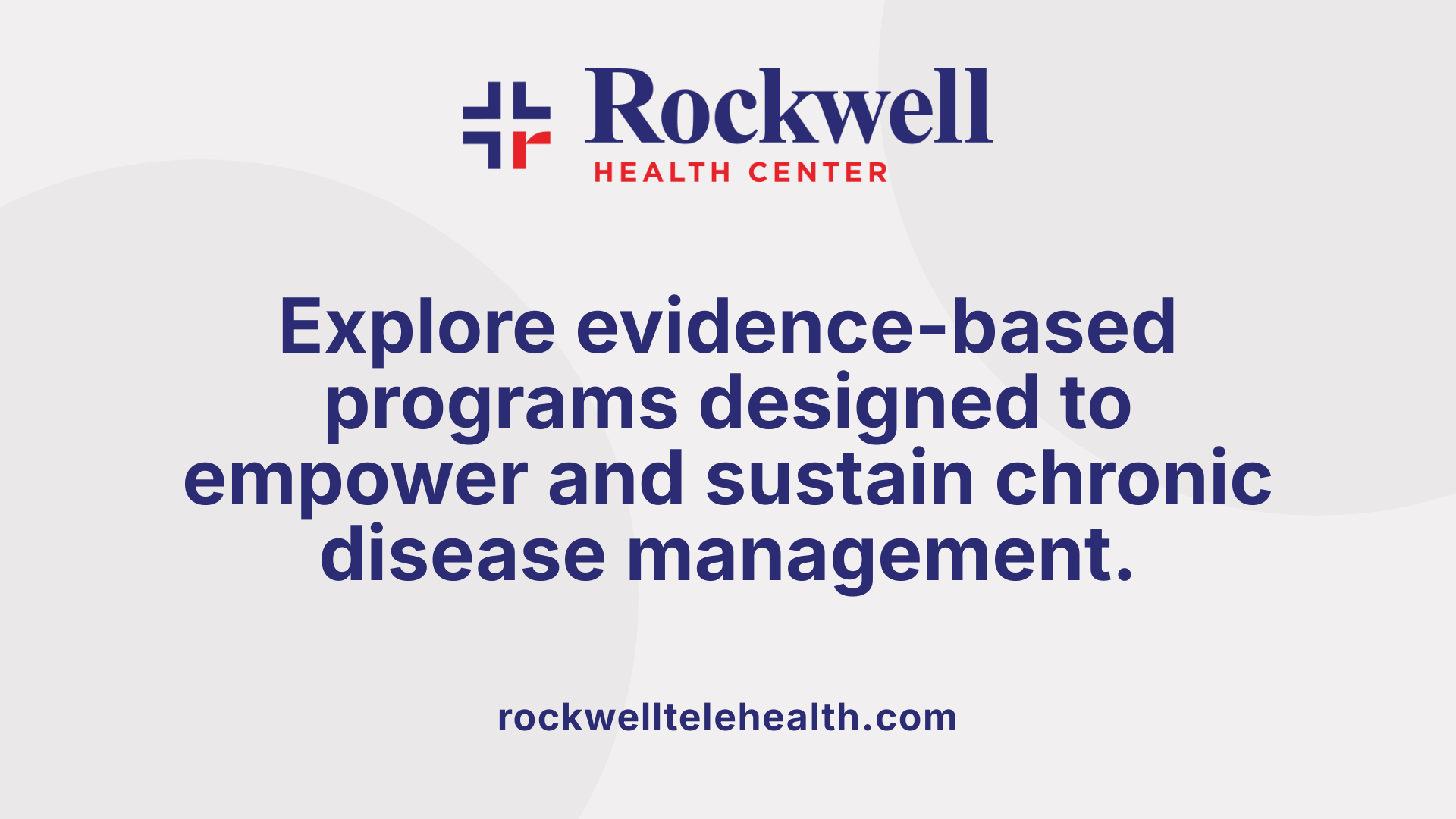Understanding and Implementing Practical Strategies for Long-Term Health Management
Living with a chronic illness requires ongoing management that aligns with daily life. This article explores effective strategies, self-management techniques, available community resources, and evidence-based programs, all designed to help individuals maintain their health and improve their quality of life. By integrating these approaches into everyday routines, patients can navigate their condition with confidence, independence, and resilience.
Building a Personalized Chronic Disease Management Routine

What are the key aspects of medication management and necessary equipment?
Effective management of chronic conditions starts with understanding and adhering to personalized medication schedules. Patients should be aware of the timing, dosage, and purpose of each medication prescribed. Using tools like pill organizers, alarms, and medication management apps can help maintain consistency and reduce errors. Additionally, certain equipment such as blood glucose monitors for diabetics, blood pressure cuffs for hypertensive patients, and inhalers for respiratory conditions are essential for regular self-monitoring. Proper training on how to use these devices ensures accurate readings and better disease control.
How can I monitor my health indicators at home?
Home monitoring empowers individuals to keep tabs on their health and catch early signs of deterioration. Regular checks of blood sugar levels, blood pressure, weight, and symptom logs provide valuable data that can be shared with healthcare providers. This self-monitoring helps in adjusting lifestyle choices, medication, and other treatment aspects promptly. Keeping a dedicated record, whether through notebooks or digital apps, facilitates ongoing assessment and can highlight patterns or triggers that affect health status.
Why are regular checkups with healthcare providers important?
Routine visits to healthcare professionals are vital to ensure the treatment plan remains effective and tailored to changing needs. During these appointments, providers evaluate how well medications, lifestyle changes, and monitoring strategies are working. They can also identify new health issues early and recommend necessary adjustments, including medication changes, additional tests, or referrals to specialists. These checkups foster a collaborative approach, reinforcing patient education and self-management skills.
| Aspect | Description | Additional Support |
|---|---|---|
| Medication adherence | Following prescribed schedules using aids like alarms or apps | Pharmacist consultations for proper use |
| Home equipment | Devices such as glucose meters, blood pressure cuffs, inhalers | Demonstrations and training programs |
| Self-monitoring | Regular tracking of symptoms, blood measurements, weight | Digital tools and logbooks |
| Regular healthcare visits | Scheduled checkups for ongoing evaluation | Telehealth options and follow-up plans |
What support options and community resources are available?
There are many avenues for support that bolster self-management efforts. Support groups, both in-person and online, connect individuals facing similar challenges, offering emotional comfort and practical advice. Community health programs, like the Stanford Chronic Disease Self-Management Program (CDSMP), provide workshops focusing on skill-building in areas such as goal setting, problem-solving, and communication with healthcare providers.
Government-funded initiatives, including programs like Better Choices, Better Health, and CDC-led community outreach, aim to improve health behaviors. These programs often incorporate topics like physical activity, healthy eating, and symptom management. Many of these resources are accessible through local clinics, community centers, or online platforms, making participation easier for diverse populations—rural residents, minority groups, and older adults.
How does chronic illness impact daily life and what are effective coping mechanisms?
Living with a chronic illness can pose significant challenges—physical limitations, fatigue, mood disorders, and social or financial strains are common. These issues can interfere with work, relationships, and personal well-being, leading to feelings of frustration and social withdrawal.
Adapting to these challenges involves employing coping strategies such as engaging in support groups, which offer shared experiences and encouragement. Mental health support including counseling, therapy, or mindfulness practices, can help manage emotional distress. Physical activity, tailored to individual capacity, and stress-reduction techniques like meditation or relaxation exercises improve overall mental health and physical resilience.
Acceptance and problem-solving play crucial roles in long-term adjustment. Using assistive devices for mobility, maintaining a balanced diet, and engaging in regular, appropriate physical activity support independence and enhance quality of life. Collaborative care involving multidisciplinary teams ensures that both physical and emotional needs are addressed, fostering a holistic approach to living well with a chronic condition.
| Aspect | Impact | Coping Strategies |
|---|---|---|
| Physical limitations | Reduced mobility, fatigue | Assistive devices, tailored exercises |
| Mental health concerns | Anxiety, depression, stress | Counseling, support groups, mindfulness |
| Social and financial stress | Social withdrawal, economic strain | Community resources, social networks |
| Managing daily routines | Disruption of normal activities | Structured schedules, support systems |
Effective self-management, rooted in personalized care, education, and community involvement, significantly improves health outcomes and quality of life for those with chronic illnesses. By integrating these practices into daily routines, individuals can better control their health, reduce complications, and maintain a greater sense of independence.
Empowering Through Education and Community Resources

What evidence-based programs and models support chronic disease self-management?
Numerous programs have been developed and supported by research to help individuals actively manage their chronic conditions. One prominent example is the Stanford University-designed Chronic Disease Self-Management Program (CDSMP). This program offers participatory workshops that focus on key skills like symptom management, goal setting, and effective communication with healthcare providers.
Other well-established models include programs such as Better Choices, Better Health; BRI Care Consultation; and the Arthritis Foundation’s self-management programs. These are tailored to specific conditions like arthritis, diabetes, and depression. These initiatives are supported by federal agencies including the Administration for Community Living and the Centers for Disease Control and Prevention (CDC). They are delivered in various formats—including in-person workshops, online courses, and self-directed sessions—to increase accessibility for diverse populations.
The core aim of these programs is to boost participants’ confidence and ability to manage their health. They provide education on healthy behaviors, medication adherence, and problem-solving skills. Multiple evaluations have shown that participation in these programs leads to measurable improvements in health outcomes, enhances quality of life, and can reduce healthcare costs. They are often facilitated by trained lay leaders, making them scalable and sustainable for community-wide dissemination.
What support options and community resources are available for managing chronic conditions?
Supporting individuals with chronic illnesses extends beyond formal programs into a range of community-based resources and support options. Support groups, for instance, provide a platform for sharing experiences, exchanging coping strategies, and gaining emotional support.
Organizations like the CDC, Stanford’s CDSMP, and various aging services offer specialized educational programs. These programs teach practical skills such as managing symptoms, engaging in safe physical activity, understanding and navigating healthcare systems, and coping with emotional challenges like stress and depression.
Access to online resources and educational materials has expanded significantly, offering information on topics such as mental health, pain management, and lifestyle modifications. Many communities host workshops, provide telehealth services, and connect individuals to mental health professionals to further bolster support.
Moreover, community-based interventions often include culturally tailored programs designed to meet the unique needs of diverse populations, including Latino, Asian American, African American, rural, and older adults. These resources aim to improve self-efficacy and foster better health management, ultimately contributing to improved outcomes and enhanced quality of life.
| Program / Resource | Focus Area | Delivery Method | Target Population |
|---|---|---|---|
| Chronic Disease Self-Management Program (CDSMP) | Symptom management, goal setting | In-person, online, self-directed | Adults with various chronic conditions |
| Better Choices, Better Health | Healthy lifestyle, decision making | Workshops, online | Adults with chronic diseases |
| Support groups | Emotional support, shared experiences | Group meetings, virtual platforms | Patients and caregivers |
| CDC community programs | Education, coping skills | Workshops, telehealth | Diverse populations |
| Culturally tailored interventions | Condition-specific education | Community-based, culturally adapted | Minority and rural populations |
This multicultural, multifaceted support network underscores the importance of accessible, culturally appropriate, community-driven resources in the ongoing management of chronic conditions.
Strategies for Incorporating Self-Management into Daily Life

What are practical lifestyle modifications to help manage chronic conditions?
Managing a chronic illness effectively often hinges on making consistent, practical lifestyle changes. Eating a balanced diet that emphasizes fruits, vegetables, whole grains, and lean proteins while limiting saturated fats, added sugars, sodium, and alcohol can significantly improve health outcomes. Regular physical activity—aiming for at least 150 minutes of moderate-intensity exercise each week—combined with muscle-strengthening activities, helps control weight, improve cardiovascular health, and boost energy levels.
Avoiding harmful habits such as smoking and excessive alcohol consumption also reduces the risk of complications like heart disease, diabetes, and certain cancers. Managing stress through techniques like meditation or deep-breathing exercises, ensuring at least seven hours of quality sleep each night, and practicing good oral hygiene are additional supportive measures. Regular health screenings and monitoring vital signs at home give patients a clearer picture of their condition.
Collaborating closely with healthcare providers ensures adherence to treatment plans and encourages incremental lifestyle changes that support overall well-being. These steps are fundamental in slowing disease progression, preventing additional health issues, and maintaining independence.
How can care coordination and patient education be integrated into daily routines?
Effective management of chronic conditions extends beyond individual lifestyle changes to encompass coordinated care and ongoing patient education. Consistent communication with healthcare providers, through electronic health records, telemedicine, or regular visits, facilitates this integration. Patients should be encouraged to engage actively by understanding their treatment plans, utilizing educational resources, and participating in support groups.
Healthcare systems like the Patient-Centered Medical Home model promote team-based, personalized care, which helps improve adherence to treatments and reduces hospital visits. Community outreach programs reinforce education and support self-management outside clinical settings.
Leveraging technology—such as smartphone apps for medication reminders or health tracking—empowers patients to monitor their health metrics daily. This proactive approach allows for timely interventions, adjustment of medications, and lifestyle modifications as needed.
Patient activation measures help identify individuals who may need additional support, enabling targeted interventions that foster better care coordination. Ultimately, combining reliable self-management education with seamless care links assists individuals in leading healthier lives despite their chronic conditions.
Living Well with Long-Term Conditions

What self-management techniques can help individuals live well with long-term health conditions?
Living with a chronic illness requires patients to actively participate in their own care. A variety of self-management techniques are designed to help individuals maintain health and improve daily life quality. Regularly monitoring symptoms, such as checking blood sugar or blood pressure, is fundamental. Patients are encouraged to adhere closely to medication schedules and adopt healthy lifestyle habits, including balanced diets and physical activity.
Participating in structured programs like the Chronic Disease Self-Management Program (CDSMP) can significantly boost confidence in managing health challenges. These programs teach skills such as goal setting, problem-solving, and self-monitoring. Communication with healthcare providers is essential to coordinate care, adjust treatment plans, and address emerging issues.
Addressing psychosocial aspects involves stress management, emotional support, and overcoming environmental barriers such as neighborhood safety or limited access to healthy foods. Support networks, community resources, and policy initiatives further empower individuals to take control of their health. Overall, self-management strategies focus on proactive engagement, helping individuals reduce hospital visits, manage symptoms effectively, and live healthier, more independent lives.
What approaches can help in proactive management and maintaining quality of life with chronic illnesses?
Proactive management hinges on consistent health monitoring and early intervention. This includes regular checkups, vigilant medication adherence, and using self-monitoring tools like wearable devices or health apps to keep track of health parameters. Lifestyle modifications are equally vital; maintaining a nutritious diet rich in fruits, vegetables, lean proteins, and whole grains while limiting added sugars, sodium, and saturated fats promotes better health outcomes.
Physical activity plays a pivotal role; engaging in at least 150 minutes of moderate-intensity exercise each week along with muscle-strengthening activities supports cardiovascular health, mobility, and overall well-being. Stress management techniques such as meditation, adequate sleep, and cognitive behavioral therapy can help mitigate mental health issues like anxiety and depression that often accompany chronic diseases.
Education about the disease, personalized care plans, and the use of technology for remote monitoring and communication with healthcare teams enable individuals to respond quickly to changes or symptoms. Emotional support through counseling or peer groups is integral to sustaining motivation and resilience.
Community engagement and policy support also play crucial roles by improving access to health resources, creating safe environments for activity and healthy eating, and reducing social isolation. These combined strategies create a robust framework for living well with chronic illnesses, emphasizing prevention, early detection, and continuous support.
| Strategy | Description | Benefits |
|---|---|---|
| Symptom monitoring | Regularly checking health indicators like blood sugar and blood pressure | Early detection of issues, better control |
| Medication adherence | Following prescribed treatment plans consistently | Prevents complications, stabilizes condition |
| Lifestyle modifications | Healthy eating, physical activity, stress management | Improves overall health, reduces disease burden |
| Self-monitoring tools | Use of wearable technology and health apps | Enhances tracking, facilitates communication |
| Education | Disease-specific knowledge, skills development | Empowers patients to manage symptoms effectively |
| Support networks | Peer groups, family, community programs | Emotional resilience, motivation |
| Healthcare provider communication | Ongoing dialogue, shared decision-making | Personalized care, adjustments to treatment plans |
How do self-management, psychosocial strategies, and community engagement work together?
Effective management of chronic conditions extends beyond medical treatment. Self-management involves patients actively learning and applying skills to decode symptoms, manage medications, and adjust behaviors. Psychosocial strategies support emotional well-being, address mental health concerns like anxiety and depression, and foster resilience. Community engagement offers vital social support, access to resources, and opportunities for physical activity, which all contribute positively.
Together, these components create a holistic approach. Patients are more likely to adhere to treatment, experience fewer complications, and enjoy a better quality of life. Healthcare providers, community organizations, and policymakers all play roles in establishing accessible programs and nurturing environments that promote health and wellness.
| Themes | Approach | Impact |
|---|---|---|
| Self-management skills | Symptom tracking, medication routines, goal setting | Increased independence, symptom control |
| Emotional and social support | Support groups, counseling, family involvement | Emotional stability, reduced stress |
| Environmental and community support | Access to parks, healthy foods, community programs | Better lifestyle adherence, reduced social isolation |
By integrating self-management techniques, psychosocial support, and community participation, individuals with long-term health conditions can lead fulfilling and balanced lives. These strategies empower patients, improve health outcomes, and foster long-term resilience.
Proven Models Supporting Long-Term Disease Management

What evidence-based programs and models support chronic disease self-management?
Effective long-term management of chronic conditions depends heavily on structured, evidence-based programs that empower individuals with the skills needed for daily health maintenance. One cornerstone initiative is the Chronic Disease Self-Management Program (CDSMP), originally created by Stanford University. This program offers participatory workshops designed to equip participants with skills like symptom management, goal setting, effective communication, problem-solving, and decision-making.
Beyond the CDSMP, numerous models focus on specific illnesses and tailored interventions. Programs such as Better Choices, Better Health; BRI Care Consultation; and the Arthritis Foundation programs are examples that cater to conditions like arthritis, diabetes, depression, and other chronic illnesses. These programs help participants develop confidence and self-efficacy, reinforcing behaviors that support better health outcomes.
Program specifics and delivery modes
To increase reach and accessibility, these programs are delivered through various formats, reflecting different needs and preferences of diverse populations. They are available in:
- In-person workshops, often conducted in community centers, clinics, or senior centers.
- Online platforms, providing flexibility for those with mobility issues or busy schedules.
- Telephone-based sessions, designed for individuals with limited internet access or comfort.
Training for lay leaders and community health workers ensures scalability and sustainability, allowing community organizations to implement these programs effectively.
Outcomes and benefits of evidence-based models
Research consistently supports the positive impacts of these programs. Participants report improvements in self-confidence, symptom management, medication adherence, and health behaviors. Additionally, evidence shows reductions in hospital visits, emergency room utilization, and healthcare costs.
Many evaluations highlight enhancements in quality of life, including better mental health, physical functioning, and social participation. Importantly, these programs help reduce the emotional and physical burden of chronic illnesses, fostering independence and resilience.
In essence, these structured, community-supported interventions provide a vital approach to managing chronic diseases sustainably. They promote proactive health behaviors, facilitate better communication with healthcare providers, and empower individuals to live healthier lives amidst long-term health challenges.
| Program Name | Focus Conditions | Delivery Mode | Reported Outcomes | Supported by |
|---|---|---|---|---|
| CDSMP | Multiple (e.g., arthritis, diabetes) | Workshop, online, phone | Improved self-efficacy, reduced hospital visits | Federal agencies, community organizations |
| Better Choices, Better Health | Diabetes, arthritis | Small group, online | Increased activity, diet improvements | CDC, ACL |
| Arthritis Foundation Programs | Arthritis | In-person, online | Pain reduction, improved mobility | Arthritis Foundation |
| Geri-Fit | Older adults with various conditions | In-person | Physical strength, balance | Local health agencies |
These programs exemplify how community-driven, evidence-based approaches can make substantial differences in managing long-term health conditions. Continuous evaluation and adaptation ensure these models remain relevant and effective across diverse populations.
Empowering Patients for Lifelong Health
Managing a chronic illness is an ongoing journey that requires integration, education, support, and proactive care. By embedding effective strategies into daily routines, utilizing community resources, and participating in evidence-based programs, individuals can maintain independence, improve health outcomes, and enjoy a higher quality of life. Collaboration between patients, healthcare providers, and community organizations forms the cornerstone of successful management, ensuring that chronic disease does not overshadow the richness of daily living.
References
- Living with a Chronic Condition
- Self-Management: A Comprehensive Approach to ...
- Evidence-Based Chronic Disease Self-Management ...
- Improved Quality of Life: How Chronic Illness Management ...
- Supporting Self-management in Patients with Chronic Illness
- What Are the Most Effective Ways to Manage Chronic ...
- 5 Practical Tips to Manage Chronic Disease Through ...
- Processes of Self-Management in Chronic Illness - PMC
























































































.png)